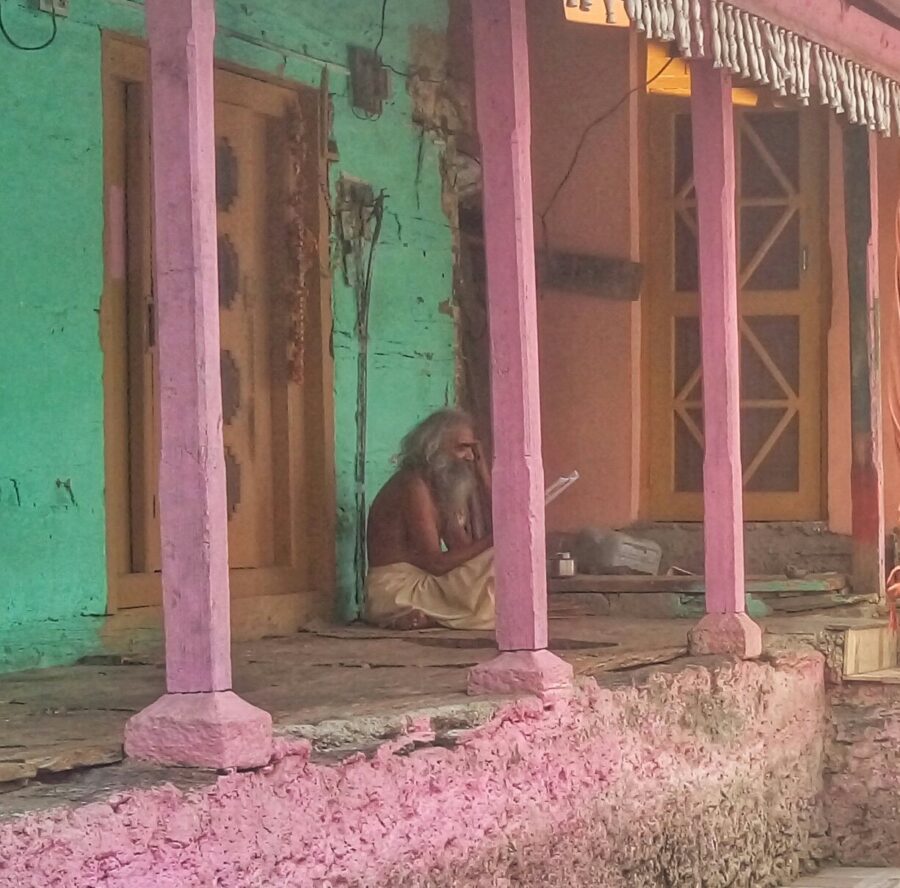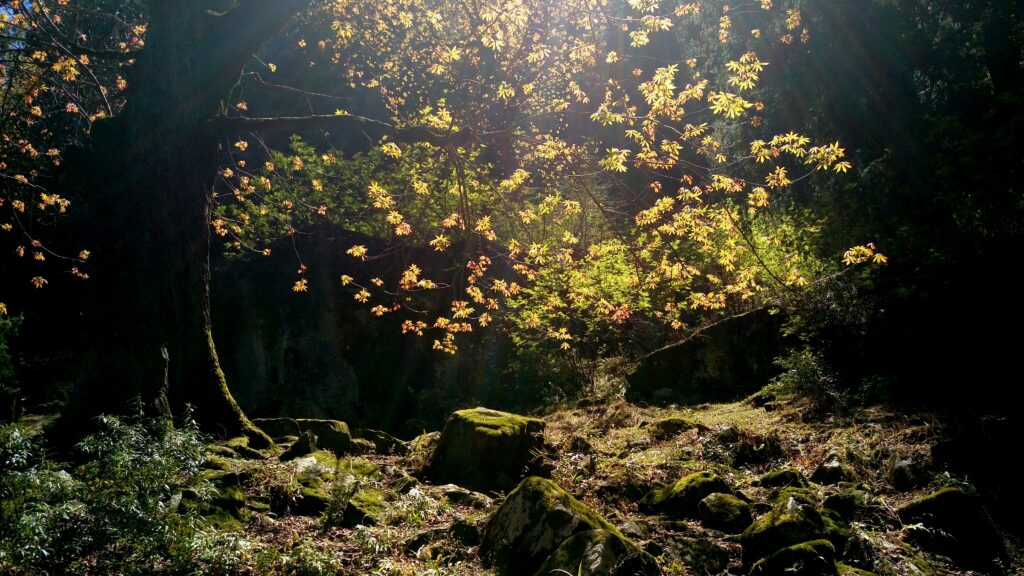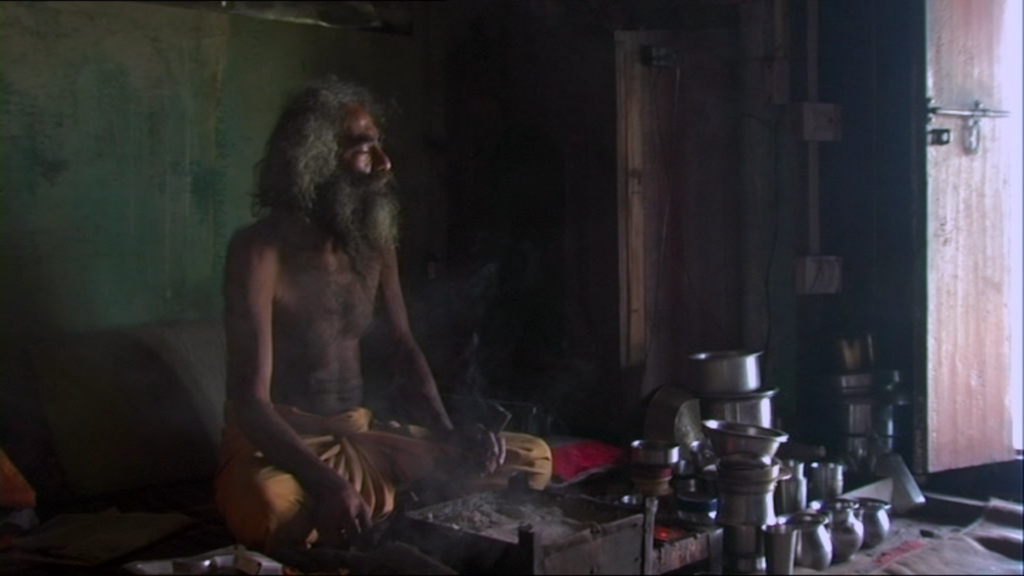Seeking the Sage

“So…he is a character in your novel?” she asks as we walk up towards his tiny house. A familiar anticipatory silence unfurls itself softly along the mountain path.
“He is the inspiration,” I say quietly and think about the enormous and old Himalayan cedar that shades his slate roof. I often imagine when he is no more, he will exist as this majestic tree and I will continue to visit, to rest my back against the sturdy and immortal trunk, inhale its fragrance and close my eyes. “For more than thirty years I lost contact with him, he was by my side all along, but I only realized it when I found him again,” I attempt to explain.
Grazing cows, holding juicy green clover in their soft mouths, pause to look with curiosity in their large melancholic eyes. People smile from beautiful old wooden porches. I imagine I see a knowing light shine gently in their eyes; as if they know why we are here, walking slowly, winding up through green terraced fields dotted with small homes surrounded by flowering gardens. The picturesque idyll is almost unreal and feels like an effect of our anticipation or the presence of the person whose wisdom we seek.

“You know the 13th century Sufi poet Rumi?” my friend asks rhetorically; she knows my love for him and continues, “His teacher, Shams, walked around the Islamic world like a vagabond for most of his life, looking for just one person, one soul who would be able to understand him. Only when he met Rumi, did his life as a teacher begin, and Rumi, who was already a renowned authority of law, philosophy, and language, became again a student. They transformed each other and Rumi shed his learning to become the timeless poet we know. What a magic time to have lived in…” my friend sighs.
We pass through an apple orchard and can see the gateway to the temple area. “Actually, it is all still here,” I say. “In a way Shams was like the Shiva renunciates of India; the sadhus. Gurus with no ashram, no fixed students, no need for fame. And like Shams, their inquiry is: What is this world? What is the true nature of man, what is consciousness and what is freedom? And moreover…” I stop dumbfounded.
The small square before the temple is a terrible mess; surprisingly a busy timber yard fills it. With a sinking feeling in my chest I realize the towering cedar giant has been uprooted by a recent storm. Long writhing branches and huge sections of the trunk block our way, a chainsaw cuts through the silence and at one side, tall stacks of cedar planks are growing. A fear that this is a bad sign grabs me. We make our way through the fragrant carnage and up the last steps. In front of a wooden Shiva temple sits a small pale green house with a pink veranda. There we take off our shoes and I knock on the screen door while trying to subdue the thought that he might also be gone. Again. But from within, his deep and soft voice slowly calls “Yes yes…come, come.”
We open the squeaky door and enter the small dark room. As our eyes adjust, we see him: on a mattress, facing a large number of neatly arranged steel pots, containers, cups, jars, and pans surrounding a hotplate. Despite his age, he sits erect and strong. Cross-legged, lean but soft bellied, dressed only in a loincloth. Like a magnificent lion’s mane, his big bushy grey hair and beard frames his infinitely kind face and its dark, sparkling, and wise eyes.

We sit down across from him. “Chai” he says as his hands automatically begin to prepare spiced milk tea. Behind him an old poster of Shiva is nailed to the beautiful green pealing wall. Bees hum lazily in and out of the beehive built into the solid doorpost of the dwelling.
“Babaji” I almost whisper, overcome with relief that he is still here, “The tree?” With short measured blows he smashes ginger to pulp with a small hammer. “Everything comes and goes,” he mumbles and looks up at me, arresting the hammer in mid-air. “Don’t you remember what I told you?” he asks. I try to guess what he alludes to; he has told me so much. He chuckles at my confusion; his eyes sparkle with joy. “Three things,” he says and holds up three fingers.
“You die every day;
You never die;
You exist nowhere.”
I sigh and cast a sideways glance at my friend, she is mesmerized and wide eyed; this is the first time she meets a sadhu. He hands us tea in steel cups. “Yes, I do remember, “I reply and sigh overwhelmed by the space of stillness that permeates the room and suspends the thoughts of my mind. Even the sounds of the chainsaw recede. We sip our tea. The clock on the wall tick tocks. I want to engage this wise being in conversation but lose myself in the supreme teaching he transfers through silence. I think about Shams’ lifelong search for a student, and then of Rumi’s subsequent search for the vanished Shams. And all the poems this agonizing separation sparked.
Still, we have come this long way. I put down my cup. “Babaji,” I begin but as I look into the glittering darkness of his deep eyes, I need to catch my breath; saying his name makes my heart swell with love. “Babaji, for so many years I longed for one thing, to one day find you again, to sit down by your holy fire for just ten minutes.” My voice begins choking from emotions, “Why… I did not even know your name…why was I allowed this blessing…and why did I meet you the first time…just for thirty years to pass?” I pause lost for words.
Babaji looks at me, “You knocked on the door….it opened.”
Tears form in my eyes. “But…Babaji…I feel I have this question…an important thing to ask you…but I don’t know what it is…”
He smiles and looks out through the screen door at the mountains. “This question…,” I continue” I…I don’t….” Uncharacteristically he interrupts me with a lifted palm, and holding my gaze he leans forward, and puts his face close to mine. In a deep and direct voice slowly, stressing each word, he says, “Who- am- I?” Time stops. We all stop breathing. He settles back with a quiet smile and, as a great tree’s leaves may settle after a gust of wind, he strokes his long beard. I sit frozen. My friend is stunned.
“That is it!” I whisper incredulously. “That is the question: Who are you? What is this? What is our connection?”
Babaji looks down on his large strong hands and quietly says, “We simply know each other from other lives…as teacher and a student…we share karma. It’s the kindness—Karuna—of God.” Tears run down my face as I tell him that he is the hidden but guiding character in my novel, Like Two Rivers. The fabled hermit that pulls a main character across continents and decades, through life.
He nods, “When you first met me, I was with my guru…I searched for years, but I found him”
My friend burst out: “But why do we long so much for understanding…for peace?” Babaji sits quietly again, closes his eyes, and speaks. “Kabir, you know Kabir the poet, he said: I see the fish in the river dying of thirst, and I Kabir, laugh.” My friend also laughs, and the next moment she is silent. I think about my novel; the characters are all struggling to know how to live the right way, how to construct a life that gives them lasting satisfaction.
“So”, I ask,” how do we attain a sense of peace… an understanding of when to act… what to choose?” The sadhu opens his eyes again and says softly. “I already told you. You have always known what you really are; you just imagined that you have forgotten.”
My friend ask how we can begin remembering.
“You did not forget, so there is nothing to remember; simply sort out what is real and constant, and what is changing imagination” Babaji replies.
“But how?” I ask.
He holds up to fingers.
“Know two things: What Am I? And what is really mine?”
Again, he looks out the screen door.
“So how do you do it?” my friend asks.
The sage laughs:
“If people knock on my door, I wake them up… It’s my job … I have no job.”
“No job?” I ask.
“I don’t do anything… the world is just an automatic flow of movement, appearing as an illusion in a field of consciousness covering everything, like water covers the fish in the river” he says.
“This body is a deception.”
“We are not even here.”
Then he closes his eyes again, thinks for a bit, then speaks:
” Rumi, you know, says something like: Study as much as you want, still you will not understand me. I am different in hundreds of ways from that which you see. Look through my eyes and see me as I see myself, for I live in a place where your eyes cannot reach”.

+ There are no comments
Add yours